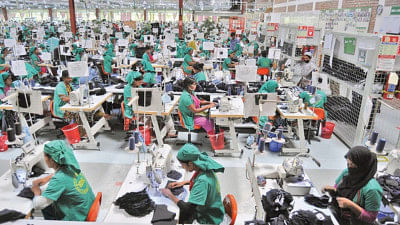Economics
Silent role of MFS to keep the economy going
With the advancement of the pandemic, the citizens of Bangladesh are leaning more and more towards adopting Mobile Financial Service (MFS) as their method of money transfer, buying products and services, buying mobile balance and making bill payments.
Navigating the socioeconomic perils of Covid-19 in Bangladesh
Despite the depressing state of major indicators such as negative export-import growth; large revenue deficit; falling private sector investment; rising non-performing loans recorded in the last quarter of 2019
Stimulus for Bangladesh’s export-oriented enterprises
On March 25, 2020, Prime Minister Sheikh Hasina announced, in her address to the nation, that the government would provide an incentive package of Taka 5,000 crore for export-oriented industries.
Financial mobility in an immobile world
The recent outbreak of Covid-19 is an unprecedented global issue, leading many to contemplate difficult questions that are plaguing all of humanity.
COVID-19 has exposed the fragility of our economies
The human dimensions of the COVID-19 pandemic reach far beyond the critical health response. All aspects of our future will be affected—economic, social and developmental. Our response must be urgent, coordinated and on a global scale, and should immediately deliver help to those most in need.
Economic threats in the time of corona
What will the impact of Covid-19 be on the Bangladesh economy? Overall, it seems inevitable that the GDP gains that were expected to be realised in the current fiscal year are likely to be wiped out.
COVID-19 and Bangladesh’s macroeconomic challenges
The world economy is now on lockdown because of the global coronavirus pandemic. Governments and their central banks around the world are wasting no time in dealing with the health and economic implications of this crisis.
Implementing SDG 6: Watering the seeds of development
Nothing is more useful than water. Ironically, hardly anything can be obtained in exchange for water.
What is needed to make the AMC solution work?
The government wants to form a public asset management company (PAMC) to buy distressed loans from banks.
The political economy of the fourth industrial revolution
There have been four waves of industrial revolution so far in the history of mankind. The first industrial revolution (from the mid-seventeenth century to the mid-eighteen century) took place in Europe and the United States. Dr Selim Raihan is Professor, Department of Economics, University of Dhaka, Bangladesh, and Executive Director, South Asian Network on Economic Modeling (SANEM). Email: [email protected]
Managing Bangladesh’s external account imbalance
Bangladesh has recorded an unprecedented 8.3 percent economic growth in the 2019 fiscal year. An accelerating economic growth coupled with a declining population growth led its per capita GDP to grow from USD 576 to about USD 2,000 in the last decade alone.
Trying times for our RMG sector
These are very challenging times for the Bangladeshi ready-made garment (RMG) industry. Bangladesh Garment Manufacturers & Exporters Association (BGMEA) recently announced that since February this year, 46 RMG factories have closed down and 25,000 workers have lost their jobs.
The economic consequence of non-performing loans
Non-performing loans (NPL) have become a worrisome issue for Bangladesh. Due to the ever-increasing volume of non-performing loans, our banking sector and the economy in general have taken a negative turn.
What does the future hold for our apparel industry?
Over recent weeks, as the world celebrated the achievements of Neil Armstrong and the crew of Apollo 11 50 years ago, and with
DIGITAL MARKETING: A two thousand crore taka market!
Digital media undoubtedly has a clear edge over traditional media in wooing customers at lower costs.
GDP growth: Illusions and fallacies
Bangladesh has been experiencing incomparable growth in Gross Domestic Product (GDP) since the last decade. The latest forecast by the Asian Development Bank ranks Bangladesh at the top among South Asian countries.
Engaging expatriates in our growth journey
The signifi-cance of expatriate engagement in emerging economies has led to substantial attention as evidenced by the growing number of studies, seminars, symposiums and conferences, pilot projects and initiatives funded by various governments and development partners. According to a Forbes article, domestic companies are now thriving and pose a real competition for multinational companies. Naturally, focusing on local markets and local consumers, these domestic companies now seek cooperation from expatriate entrepreneurs to expand their businesses.
Despite progress, young Bangladeshi women are still lagging behind
Bangladeshi women have come a long way in terms of economic and social empowerment. Yet beneath these encouraging statistics, we find some unexpected anomalies that call for serious attention.














